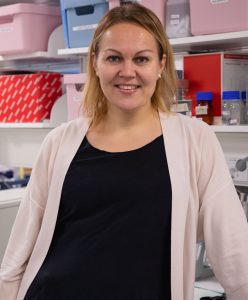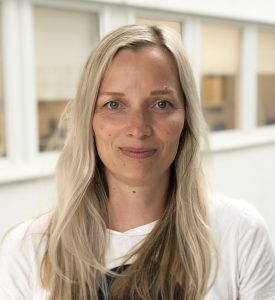
Laura Airas
Airas Group
We develop and perform clinical studies using new PET radiotracers and MRI techniques for imaging of neuroinflammation and neuroaxonal damage in multiple sclerosis and in other neurodegenerative diseases. The improved in vivo evaluation of central nervous system inflammation and damage will accelerate therapeutic development for these under-treated conditions.
https://turkupetcentre.fi/neuroinflammation-research/

Laura Elo
Computational Biomedicine
We develop computational methods and models for transforming large-scale molecular and clinical datasets to biomedical knowledge. Our specific focus is on analyzing and interpreting large digital health datasets in a robust and reproducible manner. For instance, we have identified early markers for type 1 diabetes and developed powerful computational models for predicting disease and treatment risks.
https://elolab.utu.fi/

Carlos Rogerio Figueiredo
Medical Immune Oncology Research Group (MIORG)
We design new tools that optimally detect cancer patients’ eligibility for treatment with immune checkpoint therapies (ICT). MIORG also develops new combinatory therapies that unleash the full power of these treatments on unresponsive tumors. Our vision is to conduct world-class research to unleash the benefits of ICT to refractory tumors using a reverse translational approach (Bedside to Bench) that can return new potential treatments for future clinical trials.
https://miorg.fi

Saara Hämälistö
Intercellular communication Lab
We want to understand how lysosomes and extracellular vesicles (EVs) contribute to the pathogenesis of diffuse large B cell lymphomas (DLBCL, ~600 yearly diagnoses in Finland). We investigate the possibility to pharmacologically target lysosomes to inhibit DLBCL proliferation and characterize their EV populations, with potential to discover novel biomarkers. We utilize DLBCL cells and patient samples, high-resolution imaging and three-dimensional (3D) tissue models.
https://hamalistolab.utu.fi

Arno Hänninen
Immune pathology and autoimmunity research group
Our group focuses on human and animal studies to elucidate mechanisms of autoimmunity related to the development and progression of systemic (SLE in humans) and organ-specific (T1D in NOD mice) autoimmune disease. In collaboration with rheumatologists we follow individuals who have newly-diagnosed SLE or a high probability to develop SLE within 1-2 years, and monitor their clinical and immunological status including B-cell subtypes, neutrophil ROS production and cytokine levels. We also use a tailored approach of single-cell transcriptomics to investigate cell-type -specific activities of circulating leukocytes of particular interest in SLE in each individual.
By stratifying patients according to the immunological and clinical correlates we aim to identify profiles and potential biomarkers to predict treatment responses and other clinical outcomes. and to identify novel drug targets. In T1D, we focus on the mechanisms of the immune attack targeting pancreatic islets with a particular focus on gut immune system and beta-cell response to dysbiosis.
https://www.utu.fi/en/people/arno-hanninen

Maija Hollmen
Tumor Immunology and Immunotherapy
We study how cancer cells modify innate immune responses to support tumor growth and investigate the potential of targeting novel pathways to improve immunotherapy responses in cancer patients.
https://hollmenlab.com/

Riitta Lahesmaa
Molecular Systems Immunology
We study molecular mechanisms and regulation of human immune response as well as pathogenesis of human immune mediated diseases such as type 1 diabetes. We have discovered novel factors and modes of action to modulate T cell functions. Characterization of immune response from birth to the onset of disease we have shed light to disease process and identified candidate biomarkers to improve prediction and early diagnosis of type 1 diabetes.
https://bioscience.fi/research/molecular-systems-immunology/profile/

Xiang-Guo Li
Radiopharmacy Lab
We develop radioactive molecules to meet the clinical needs and to probe biomedical mechanisms. Positron emission tomography (PET) is a technology for imaging-based medical diagnosis. In PET imaging, radioactive drugs are needed to indicate the diseased sites in the body. We design and produce new radioactive drugs. We test how they work and apply them for medical imaging with a focus on immune cell targeting.
https://www.utu.fi/en/people/xiang-guo-li

Tapio Lönnberg
Single-Cell Immunogenomics
Our research aims at gaining deeper understanding of cell fate decisions in the immune. We leverage single-cell and spatial omics to explore phenotypic heterogeneity beyond the immune cell subsets defined by the expression of cell surface markers. Our current research encompasses arthritic, autoimmune, and cardiovascular diseases, aiming to identify core gene modules that are associated with disease state and can be exploited for more efficient diagnosis, patient stratification, and therapies.
https://bioscience.fi/research/single-cell-genomics-immunology/profile/

Pieta Mattila
Lymphocyte Cell Biology Lab
T and B lymphocytes, vital for our health, form the adaptive immune system. We investigate the regulation of B lymphocyte activation that mounts specific and highly effective antibody responses against pathogens. However, if lymphocyte activation is defected, we face pathological conditions such as autoimmunity or lymphoma. In our research, we integrate advanced light microscopy and proteomics with cellular and in vivo models, to gain novel understanding on the cell biological phenomena of B cell activation.
http://mattilalab.utu.fi

Alexander Mildner
Innate Immunity Lab
We investigate the differentiation of myeloid cells under pathological conditions such as autoimmune diseases (e.g. multiple sclerosis) and chronic inflammation (e.g. atherosclerosis or obesity). The central goal of our laboratory is to identify new genetic factors that are involved in the differentiation of these cells and that drive their inflammatory response. Blocking the detrimental activities of myeloid cells under inflammatory conditions will beneficially influence disease progression and represents an attractive therapeutic target.
https://mildnerlab.utu.fi/

Elisa Närvä
Pluripotency & Cancer Laboratory
Our research focus is to understand the unique life of pluripotent stem cells and cancer-associated stem cells, which utilize developmental pathways to drive self-renewal and plasticity. We aim to characterize the role of pluripotency-associated factors in the development and cancer. The ultimate aim is to boost the development of regenerative medicine, detection tools for cancer stem cells, and cancer therapies.
https://narvalab.utu.fi/

Matej Oresic
Systems medicine
We are interested in the identification of disease vulnerabilities associated with different metabolic phenotypes and the underlying mechanisms linking these vulnerabilities with the development of specific disorders or their co-morbidities. One of the main research areas are investigations of early metabolic disturbances preceding immune-mediated inflammatory disorders, specifically type 1 diabetes.
https://bioscience.fi/research/systems-medicine/profile/

Pia Rantakari
Macrophage ontogeny and function
Our research attention is on embryonic-origin tissue-resident macrophages in normal and in pathophysiology. Our specific focus is on cross-talk between the immune and endocrine systems and enlightening the potential functional consequences of the divergent origins of tissue-resident macrophages in individual endocrine organs. The long-term goal is to understand the complex biology of macrophages better and offer a basis for identifying therapeutic/preventative applications using macrophages.
https://plvap.utu.fi

Anne Roivainen
In Vivo Imaging of Inflammation
Positron emission tomography (PET) with targeted probes enables evaluation of the molecular and cellular pathophysiological mechanisms of diseases. We are developing new radiopharmaceuticals for whole body imaging and quantification of inflammation. My research group works at the Turku PET Centre where we have state-of-art infrastructure to be at the forefront of international development in the field. The new imaging agents are evaluated in experimental disease models, in healthy subjects and in patients. The results of these studies are expected to provide new tools for molecular imaging and promote the translation of these tools into clinical use.
https://inflammation-imaging.utu.fi/

Akira Takeda
Immune and structural cell interaction in health and disease
Although immune cells play a critical role in human diseases such as infection and cancer, structural cells including endothelial and stromal cells are also crucial for maintaining the function of the immune cells. The aim of our group is (1) to find unrecognized heterogeneous structural cell subsets in human organs using single-cell technologies, and (2) to find the new molecular mechanism between structural cells and immune cells in health and disease.
https://takedalab.utu.fi

Kirsi Virtanen
Human brown fat research
Our research focus to understand the function of human brown fat in health and in metabolic disorders. We utilize functional imaging (positron emission tomography, PET, combined with computed tomography, CT, or magnetic resonance imaging, MRI) in the metabolic studies in humans. We also collect brown and white adipose tissue samples for more comprehensive understanding of molecular mechanisms in relation to imaging data.


